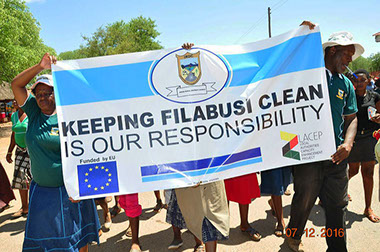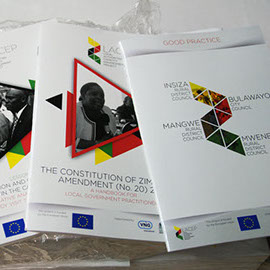Annual Update 2018 VNG International

‘The Council was failing to engage us. We as residents were failing to engage the Council. The concept of mistrust is no longer in us, it is now a buried issue. Now the Council and the residents are just a unity with one vision and one focus.’
Lameck Ndlovu
Filabusi Residents Association

‘Citizens can now input in the decisions that the Council makes. So that the decisions are not just those of the Council but decisions of Bulawayo, as a city with people that live in it. (...) In the past our policies have been tilted in favour of men. We are now saying: women must also participate as actively and effectively as men. It’s about fairness. That is a milestone that must be achieved.’
Martin Moyo
Mayor Bulawayo
building more effective public administration by strengthening
local government
Featured Project
Zimbabwe, Local Authorities Capacity Enhancement Project
(LACEP)
> LACEP connects service improvement at the municipal level with enhanced citizen-local governments relations. The focus was on 13 rural district councils (RDCs), but attention was also given to the relations between central and local governments, and the role of the local government associations in that respect.
LACEP provided training for local governments and training of trainers for CSOs; developed a series of products for continued use after the project, e.g. a Handbook on Participatory Policy Making and a Handbook for local government practitioners explaining the Constitution of Zimbabwe. LACEP also supported sub-national level multi-stakeholder dialogues, involving local authorities (LAs), government agencies, residents associations and other CSOs.
Results include:
- All 13 participating LAs put into practice the use of participatory policy-making tools in municipal planning and/or service delivery, leading to policy initiatives based on the direct needs identified by the citizens (a.o. waste management, a health clinic, a gender policy, …).
- All 13 LAs have used participatory budgeting tools. Take Mangwe RDC which used to treat budgeting as an isolated activity, but where residents now are engaged during budget formulation, resource mobilisation and implementation of the budget;
- The joint trainings on Participatory Policy Making have increased the level of trust between the LAs and the citizens, and the understanding of the various roles and limitations of the different stakeholders. In Bikita, Insiza and Mwenezii this has led to citizens playing a role in the management of solid waste, which resulted in cleaner environments;
- Generally the participation of citizens, including disadvantaged groups such as women and children in the budgeting process has increased in all 13 participating LAs;
- LACEP has managed to create an enabling environment for discussing governance reforms at the local level. This space has been fundamentally driven by the stakeholder themselves;
- Strengthened common understanding and mutual commitment between the local government associations UCAZ and ARDCZ and the Ministries responsible for Local Government in Zimbabwe to work together for enhanced devolution in Zimbabwe;
- Increased awareness among all 45 local authorities of the South Western Region of the Constitution and the (new) role and responsibilities of local authorities according to the Constitution;
- A strong increase in exchange and learning between the participating LAs, including through a learning benchmark.